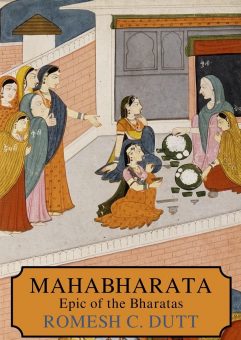The Sacrifice of the Horse was an ancient Hindu custom practised by kings exercising suzerain powers over surrounding kings. A horse was let free, and was allowed to wander from place to place, accompanied by the king’s guard. If any neighbouring king ventured to detain the animal, it was a signal for war. If no king ventured to restrain the wanderer, it was considered a tacit mark of submission to the owner of the animal. And when the horse returned from its peregrinations, it was sacrificed with great pomp and splendour at a feast to which all neighbouring kings were invited.
Yudhishthir allowed the sacrificial horse to wander at will, and Arjun accompanied it. Wherever the horse was stopped, Arjun fought and conquered, and thus proclaimed the supremacy of Yudhishthir over all neighbouring potentates. After various wars and adventures in various regions, Arjun at last returned victorious with the steed to Hastinapura, and the sacrifice commenced.
The description of the sacrifice is somewhat artificial, and concerns itself with rites and ceremonious details and gifts to Brahmans, and altogether bears unmistakable evidence of the interpolating hand of later priestly writers. Nevertheless we cannot exclude from this [359] translation of the leading incidents of the Epic the last great and crowning act of Yudhishthir, now anointed monarch of Kuruland.
The portion translated in this Book forms Sections lxxxv. and parts of Sections lxxxviii. and lxxxix. of Book xiv. of the original text.
I. The Gathering
Victor of a hundred battles, Arjun bent his homeward way,
Following still the sacred charger free to wander as it may,
Strolling minstrels to Yudhishthir spake of the returning steed,
Spake of Arjun wending homeward with the victor’s crown of meed,
And they sang of Arjun’s triumphs in Gandhara’s distant vale,
On the banks of Brahmaputra and in Sindhu’s rocky dale.
Twelfth day came of Magha’s bright moon and auspicious was the star,
Nigher came the victor Arjun from his conquests near and far,
Good Yudhishthir called his brothers, faithful twins and Bhima true,
Spake to them in gentle accents, and his words were grave and few:
“Bhima! Now returneth Arjun with the steed from many a fray,
So they tell me, noble brother, who have met him on the way,
And the time of aswa-medha day by day is drawing nigh,
Magha’s full moon is approaching, and the winter passeth by,
Let the Brahmans versed in Vedas choose the sacrificial site,
For the feast of many nations, for the aswa-medha rite.”
Bhima heard of Arjun’s coming, – hero with the curly hair, –
And to do Yudhishthir’s mandate did with gladsome heart repair,
Brahmans versed in sacrifices, cunning architects of fame,
Builders of each various altar with the son of Pritha came,
[360] And upon a level greensward measured forth the sacred site,
Laid it out with halls and pathways for the sacrificial rite.
Mansions graced with gem and jewel round the bright arena shone,
Palaces of golden lustre glinted in the morning sun,
Gilt and blazoned with devices lofty columns stood around,
Graceful arches gold-surmounted spanned the consecrated ground.
Gay pavilions rose in beauty round the sacrificial site,
For the queens of crownéd monarchs wending to the holy rite,
Humbler dwellings rose for Brahmans, priests of learning and of fame,
Come to view Yudhishthir’s yajna and to bless Yudhishthir’s name.
Messengers with kindly greetings went to monarchs far-renowned,
Asked them to Hastina’s city, to the consecrated ground,
And to please the great Yudhishthir came each king and chieftain bold,
With their slaves and dark-eyed damsels, arms and horses gems and gold,
Came and found a royal welcome in pavilions rich and high,
And the sealike voice of nations smote the echoing vault of sky!
With his greetings did Yudhishthir, for each chief and king of men,
Cooling drinks and sumptuous viands, beds of regal pride ordain,
Stables filled with corn and barley and with milk and luscious cane
Greeted tall and warlike tuskers and the steeds with flowing mane.
Munis from their hermitages to the sacred yajna came,
Rishis from the grove and forest lisping BRAHMA’S holy name,
Pages: 1 2 3 4 5 6 7 8 9 10 11 12 13 14 15 16 17 18 19 20 21 22 23 24 25 26 27 28 29 30 31 32 33 34 35 36 37 38 39 40 41 42 43 44 45 46 47 48 49 50 51 52 53 54 55 56 57 58 59 60 61 62 63 64 65 66 67 68 69 70 71 72 73 74 75 76 77 78 79 80 81




